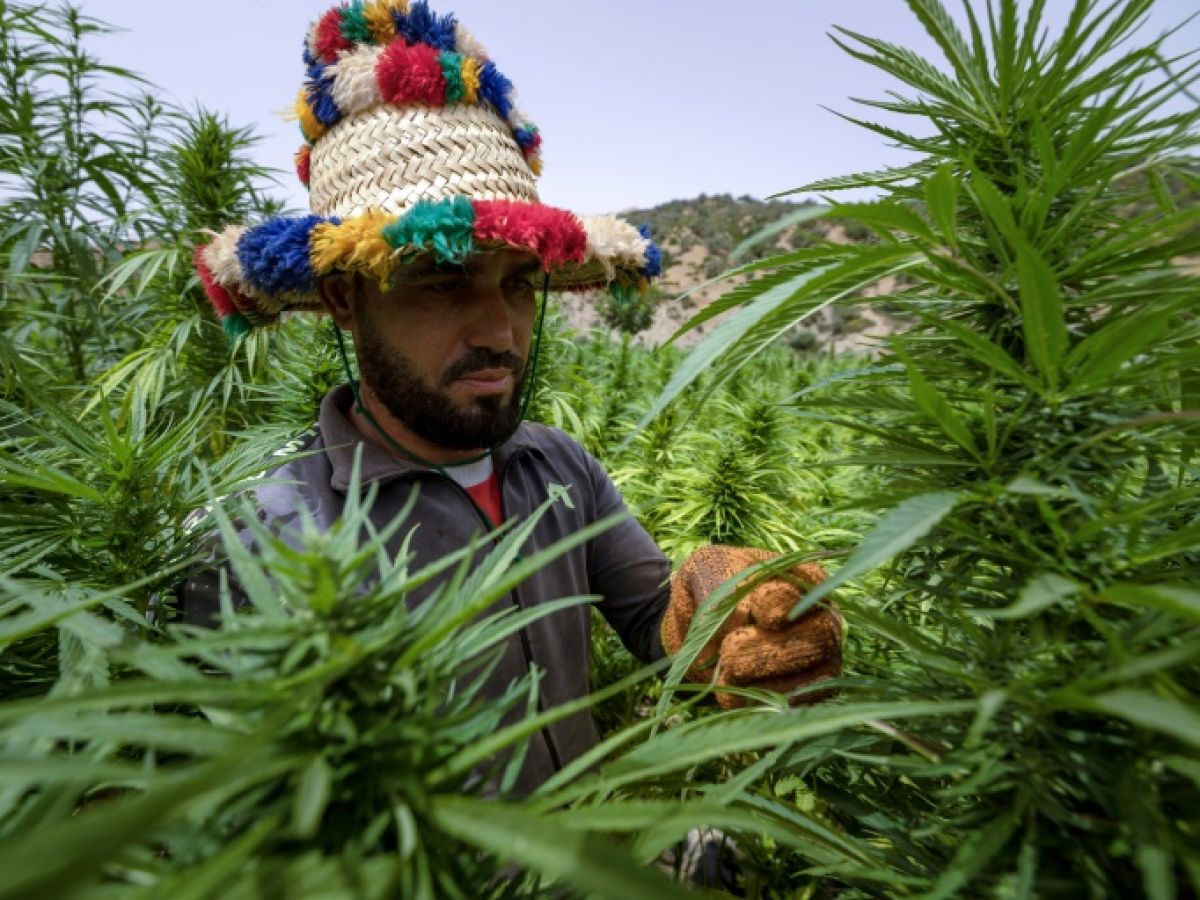"Today, we work in broad daylight." Abdesselam Ichou has been legally growing cannabis for therapeutic use in northern Morocco for the second consecutive year, after decades of "fear and anxiety" in the underground.
Morocco, the world's leading producer of cannabis according to the UN, adopted a law in 2021 regulating the industrial and medical uses of cannabis, authorizing its cultivation and exploitation in three deprived rural provinces of the Rif region.
The kingdom is thus seeking to combat trafficking, position itself on the global market for legal cannabis and economically open up the Rif, where the plant has been cultivated for centuries and supports between 80,000 and 120,000 families, according to official estimates.
"I never imagined that one day I would be able to grow kif without the fear and anxiety of being arrested, robbed or not selling my harvest," Abdesselam Ichou, a 48-year-old farmer from Mansoura, in the Chefchaouen region, more than 300 km north of Rabat, told AFP.
In 2023, the first harvest of legal cannabis, from imported seeds with a very low THC content (psychoactive molecule of cannabis), reached 296 tonnes, according to the National Agency for the Regulation of Activities Relating to Cannabis (Anrac).
"Before, it was the jungle, anarchy. Today, we work freely and with dignity," says Mr. Ichou, proudly showing his cannabis plots, which provide him with a much more regular income than illegal plantations.
He claims to have harvested last year "a record harvest of around eight tonnes from one hectare", valued at 60,000 euros, after its sale at 80 dirhams per kilo of undried grass (7.5 euros) to a Moroccan company, which decided to invest in two additional hectares this year.
– “The right way” –
If in 2023 Mr. Ichou was the only farmer in the village cultivating legally, a year later there are about 70, he says.
This enthusiasm is found in the provinces where cultivation is authorized (Al Hoceima, Chefchaouen and Taounate): in one year, the number of farmers having integrated the legal circuit has increased from 430 to 3,000, according to Anrac.
Still a long way from the 55,000 hectares of illegal plantations recorded in 2019, the area of legal cannabis has nevertheless increased tenfold, going from 286 hectares in 2023 to 2,700 hectares in 2024, according to this source.
"At the beginning, there was a lot of apprehension and questions, but little by little it dissipated because ultimately legalization is the right path to follow," says Said El Gueddar, 47, who joined a cooperative of around ten farmers.
According to official figures, in 20 years, revenues from cannabis trafficking in Morocco have decreased from 500 million euros in 2000 to almost 325 million in 2020, due to increased repression.
"I have a lot of hope because it can only be better than living in the precariousness of clandestinity," notes Mr. Gueddar during the transplantation of imported cannabis shoots, in preparation for their harvest in October.
The very first legal harvest of the local variety, beldia, will take place in August. "It is a major asset for us, we want to promote it as much as possible" as a local product, explains Mr. Ichou who convinced 58 farmers to create a dedicated cooperative on more than 200 hectares.
– “Attractive sector” –
Anrac has issued more than 200 authorisations to manufacturers for processing, importing and exporting seeds.
Aziz Makhlouf seized the opportunity by creating "Biocannat", a factory with 24 employees in Bab Berred (southeast of Chefchaouen) which, since the beginning of the year, has transformed around thirty tons of cannabis into different products sold locally and for export: CBD resin and oil, flour, creams, sweets and food supplements.
"There are quite a few opportunities, it's an attractive sector," summarizes Mr. Makhlouf.
The UN recognized in 2020 the medical utility of cannabis, previously listed among specific deadly and addictive opioids, including heroin, recognized as having little or no therapeutic purposes.
It will be difficult "to absorb the illicit sector immediately because there is a market," Mohamed El Guerrouj, director general of Anrac, told AFP.
However, the regulation allows us to "build a reliable and resilient economy, slowly," he emphasizes, setting as a first objective "the improvement of the standard of living" of farmers.
Although the legal sector is still embryonic, growers could receive 12% in turnover compared to "4% on the illegal market", according to official studies.
But for Mr. Guerrouj, the most important thing is to allow these populations to "come out of the shadows and move towards the light."
